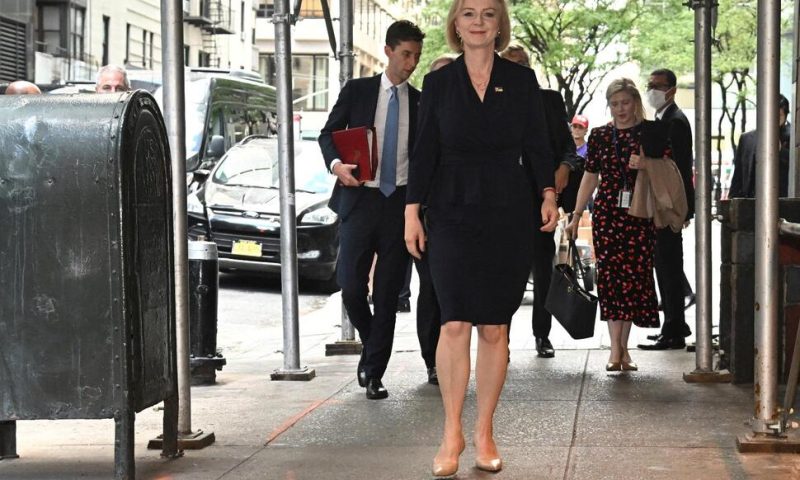Britain’s government says it will cap wholesale energy bills for businesses this winter to ensure companies don’t go bust amid soaring energy prices.
LONDON — Britain’s government said Wednesday it will cap wholesale energy bills for businesses this winter to ensure companies don’t go bust amid soaring energy prices.
Authorities said the government will pick up nearly half of all business energy bills for six months starting Oct. 1 to ensure companies “are able to get through this winter.”
“We’re going to review it after six months. We’ll make sure that the most vulnerable businesses like pubs, like shops, continue to be supported after that,” said Prime Minister Liz Truss, who is in New York to attend the U.N. General Assembly.
U.K. Treasury chief Kwasi Kwarteng said the government measures would “stop businesses collapsing, protect jobs and limit inflation,” though critics predicted it would lead to higher interest rates and government debt.
Officials have not provided details on how much the support package will cost, but it is expected to run to billions of pounds (dollars). Accountancy firm PwC estimated the measure to help businesses could cost from 10 to 20 billion pounds.
The news followed similar measures announced earlier this month to cap domestic energy prices to help millions of people heat their homes amid a cost-of-living crisis.
Spiraling gas and electricity bills, together with steeply rising food costs, have driven inflation in the U.K. to its highest level in decades. The Bank of England expects the economy to go into a recession next year.
The consumer price index hit 10.1% in July, though it decreased slightly to 9.9% in August. Britons were accustomed for years to an average inflation rate of around 2%.
Officials are expected to push through emergency legislation for the relief plans once Parliament returns in October.
The British Beer and Pub Association and UK Hospitality were among the trade bodies that welcomed the news, saying the unprecedented government intervention would provide a lifeline for many businesses.
But some groups expressed worry that the price cap was a short-term fix and said companies needed a longer-term solution to make plans to invest or grow.
“Six months’ support is not enough to make plans for the future,” Shevaun Haviland, director general of the British Chambers of Commerce, said.
Truss announced a two-year “energy price guarantee” for consumers on Sept. 8 that caps average household bills for heating and electricity at 2,500 pounds ($2,872) a year. The household average was expected to rise to 3,500 pounds ($4,000) a year beginning in October, an 80% jump from the current average annual bill of 1,971 pounds ($2,236).
Russia’s war in Ukraine and the political fallout from international sanctions have triggered an energy crisis by reducing supplies of cheap natural gas that the continent depended on for years.
Britain is more vulnerable to volatility in international gas prices than some other European countries because it imports most of its natural gas — though largely from Norway, not Russia. Compared to residential properties in Europe, U.K. homes also rely more heavily on gas for heating and generating electricity.

